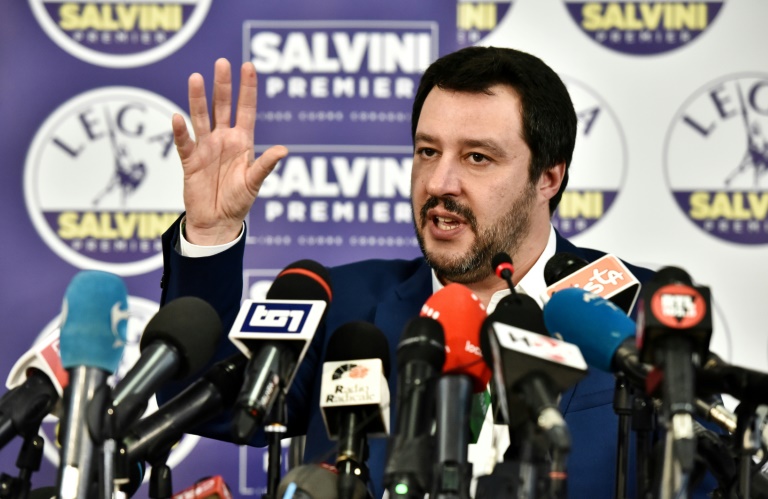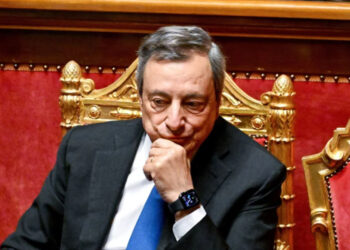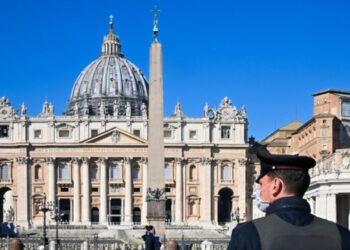Christmas time in Italy has been marked not only by celebrations but also by a renewed debate over the meaning of political correctness. In the country where Catholics make up about 88 percent of all citizens, the new far-right government wants to reinforce traditions by installing crucifixes and nativity scenes in classrooms.
Matteo Salvini, who has been serving as Deputy Prime Minister and Minister of the Interior since June 1, has already proposed displaying crucifixes in all public places, including ports, embassies, and prisons.
The Northern League party, headed by Salvini, has made similar attempts in the past: a bill was introduced for debate in the Italian parliament in July that required the visible display of crucifixes in public buildings. It includes fines for failing to comply from €500 ($560) to €1,000 ($1,130).
“To delete the symbols of our identity, the undisputed glue that holds a community, means to empty the morals on which our society is based,” read the motivation that accompanied the text of the bill. “Respecting minorities does not mean giving up, delegitimizing or changing the symbols and values that are an essential part of our history, culture and traditions of our country.”
Reverend Antonio Spadaro, the editor of Jesuit magazine La Civiltà Cattolica, argued against the move. He said the crucifix should never be used as a political symbol, noting that politicians should keep their hands off it.
“The cross is a sign of protest against sin, violence, injustice, and death. It is NEVER a sign of identity. It screams of love to the enemy and unconditional welcome. It is an embrace from God without defenses,” he wrote.
The bill has not been passed yet, but the issue of crucifixes on public display came back under the spotlight when a school in the city of Terni, northeast of Rome, canceled its traditional nativity play in order to respect children with different religious backgrounds.
“It is not just about religion, but about history, roots, culture. I will not give up,” Salvini responded on Facebook. “Long live our traditions, and may they spread!”
What happened in Terni sparked a debate among supporters of the move and those who do not want to mix religion with politics.
“I think politics has nothing to do with it, but it is stupid [not display a crucifix] because it has always been a part of our culture. The crucifix is a symbol of Italy, also for atheists. The issue comes because the society is no longer Catholic and the anti-catholics values are present more than ever,” Giulio, a priest in a church in Rome, told The Globe Post.
Amid the controversy, Education Minister Marco Bussetti granted approval to installing crucifixes and nativity scenes in Italian classrooms in November.
“I simply believe that different religious sensibilities are not respected by hiding their roots and their identity. The crucifix in classrooms and nativity scenes during the Christmas holidays are parts of our culture. For this reason, hiding them is not an educational message,” Bussetti told The Globe Post.
“There is much talk of inclusion. But inclusion is not achieved by denying traditions. It is always from the awareness that respect is born…If we betray ourselves, we will never know how to accept others.”
Since the law has not been introduced yet, the decision to hang crucifixes at schools or not depends on deans or teachers themselves.
Carmen D’Emilio, a primary school teacher from Rome, said classes are more multicultural now, but her school has a religion teacher who wants to keep the tradition alive and sets up the nativity scene every year.
“Our school has a Communist origin because for several years there was a dean who [believed in] the communist ideology and the crucifixes were removed. Now it [depends on] on the initiative of an individual: there are some classes where there is a crucifix and other where it is absent,” she told The Globe Post.
Arts school professor Francesco Leone said there is the recognition of Catholicism in high schools, but there has never been the need to have a strict religious environment.
“It is not required anywhere, the bill has not yet been passed, but it has not really been taken into consideration in our school,” Leone said.






















